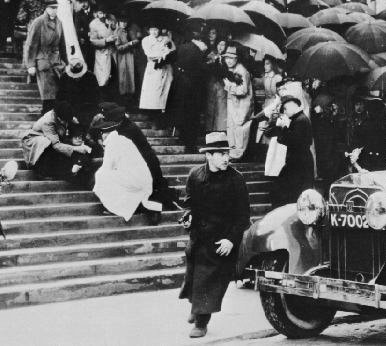
By Eric Jessen 7/1/09
The devastation of war was in the air in Europe and America in 1940. Alfred Hitchcock responds with a tentative anti war statement in Foreign Correspondent. He puts together a wonderful cast, a who's who of some of my favorite actors. There is the always lovable Joel McCrea as the foreign correspondent, George Sanders as a fellow correspondent, Scott, (he's less scheming in Foreign Correspondent then I prefer him.) There is also fast talking Herbert Marshal as the sort of good, sort of bad guy spy Stephen Fisher. The girl (because there's always a girl) is Carol Fisher played by Laraine Day. She's falling in love with the foreign correspondent just as he is trying to expose her father Stephen. Day is bland for my taste, not really worth risking your life for.
Foreign Correspondent is toned down Hitchcock. He appears to be pulling his punches as the master of suspense in favor of a very moral war message. It appears Hitchcock doesn't know how to make a political point. He should stick to truly twisted suspense. (How can you not love Vertigo and Psycho.) The plot is convoluted and so is the message. McCrea plays a foreign correspondent who is inexperienced and a bit of a boob. He stumbles upon the story of the year just as war approaches. There are spies, a faked assassination, the whole lot. But no one believes him. He looks to Stephen Fisher for help. Just as he starts to fall in love with Fisher's daughter Carol, Fisher tries to have him killed. He doesn't know who he can trust, and he is starting to wish he could just ditch his correspondency and marry Carol. He's in quite a pickle. Luckily smooth talking reporter, Scott, who knows the ropes, has got everything figured out. It turns out Fisher is a spy working for the Germans. This is where the war message starts to come together. Scott is trying to have our beloved foreign correspondent killed but he's just doing it out of loyalty for his country. He's really a good guy, the nasty war is making him do it. People will do terribly uncivilized things during war. And guess who's caught in the fray, the overly good Carol (Laraine Day). She still loves her father, the traitor spy, and the foreign correspondent who is trying to expose him. I guess the message is, war is bad and people are good, but war makes good people do bad things. This message is refreshing compared to the usual, that the Germans are bad and everyone else is good. Still, this is not up Hitchcock's alley. The political message muddles his ability to have a purely exciting thriller. The movie gets boring and stale. The final scene, with the American national anthem playing in the background, is bloated. It was like the painfully long speech by Chaplin at the end of The Great Dictator. These directors should just stick to what they're good at.
Overall this is not a bad movie. It has its moments of Hitchcockiness. It is well made, just not at as thrilling as it could have been. I guess with fear of war in the air, Hitchcock couldn't resist giving his two cents.
No comments:
Post a Comment